Key takeaways:
- Volunteer border patrols play a crucial role in fostering community trust and enhancing national security through active participation and local insights.
- Training is essential for effective border patrols, emphasizing situational awareness, ongoing education, and team camaraderie to improve performance.
- Personal experiences in border patrol highlight the emotional toll of the work, underscoring the importance of empathy and the human stories behind border encounters.
- Challenges faced include balancing enforcement with compassion and managing the emotional impact of witnessing migrants’ struggles, emphasizing the need for connection and understanding.
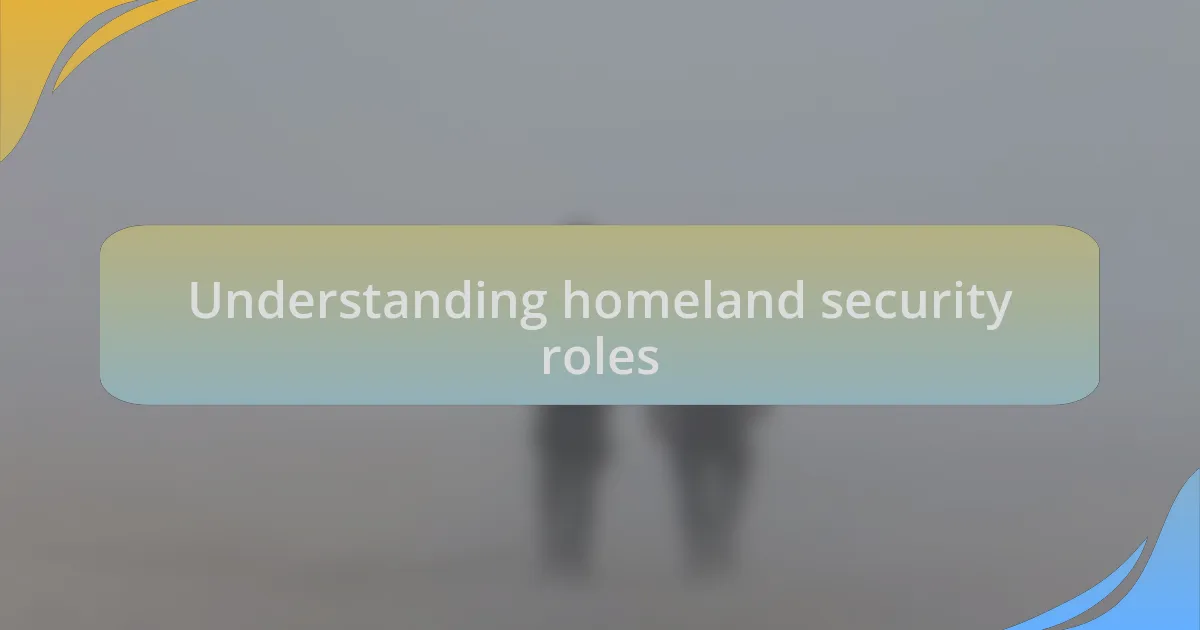
Understanding homeland security roles
Homeland security roles are crucial in maintaining the safety and stability of our nation. I vividly recall my first day volunteering at a border patrol site; the atmosphere was charged with purpose and urgency. It made me think: how much responsibility lies on the shoulders of those who protect us?
Each role within homeland security serves a unique function, from intelligence analysis to emergency management. During my time on patrol, I witnessed firsthand how dedicated individuals work tirelessly to ensure border integrity. It really hit home when I saw teams collaborating during a crisis—I realized that effective communication is as vital as the physical presence of personnel.
It’s essential to understand that these roles also require a strong emotional component. The human stories behind the statistics are powerful. Have you ever considered the toll it takes on personnel when they continuously encounter challenging situations? I found that these experiences not only shape their careers but also their view of the world, highlighting the need for empathy in all aspects of homeland security.
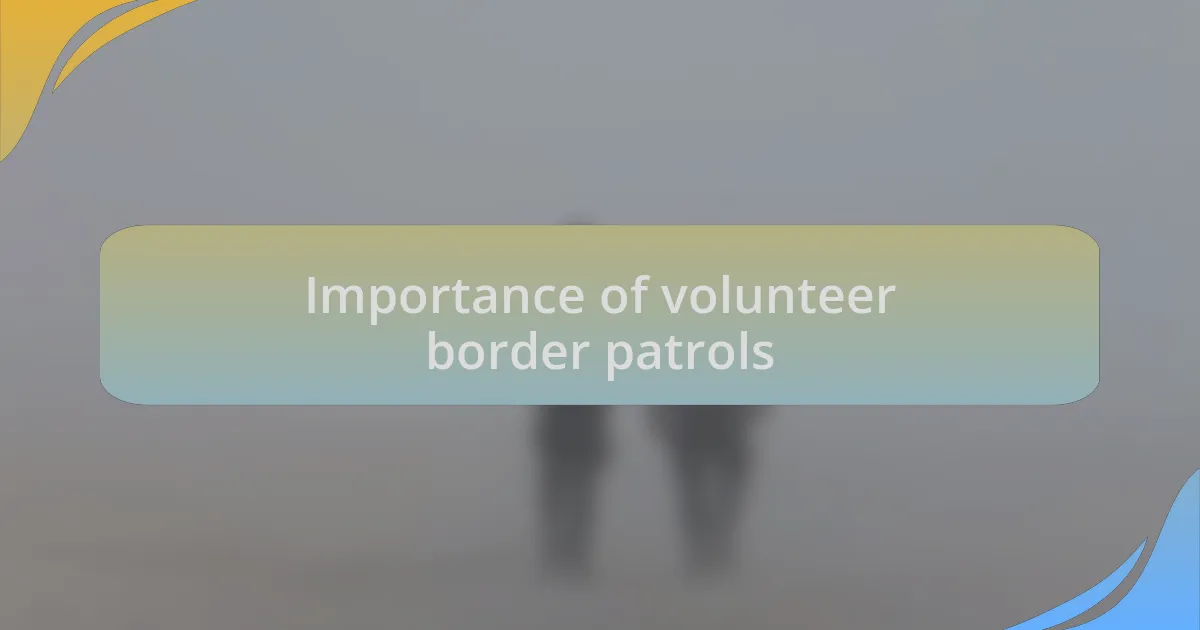
Importance of volunteer border patrols
The role of volunteer border patrols cannot be overstated. They serve as the backbone of community involvement in national security, providing local insight and support. I remember one night on patrol when a local family shared their concerns about safety in their neighborhood; their anxiety underscored that volunteers are not just observers but active participants in peacekeeping.
In my experience, volunteer border patrols create a bridge between law enforcement and the community. This connection fosters trust and cooperation, which is essential for effective border security. I distinctly recall engaging in discussions with residents during our patrols; it became clear that when people feel included in the security dialogue, they are more likely to report suspicious activities, ultimately enhancing safety for everyone.
Moreover, these volunteers bring unique perspectives and skills that professional agents may not have. Many volunteers come from various backgrounds and experiences, which can enrich the overall response to border security challenges. It’s interesting to think about how a community member’s knowledge of local terrain or languages can be a game-changer. How often do we undervalue the contributions of everyday citizens until we see them in action?
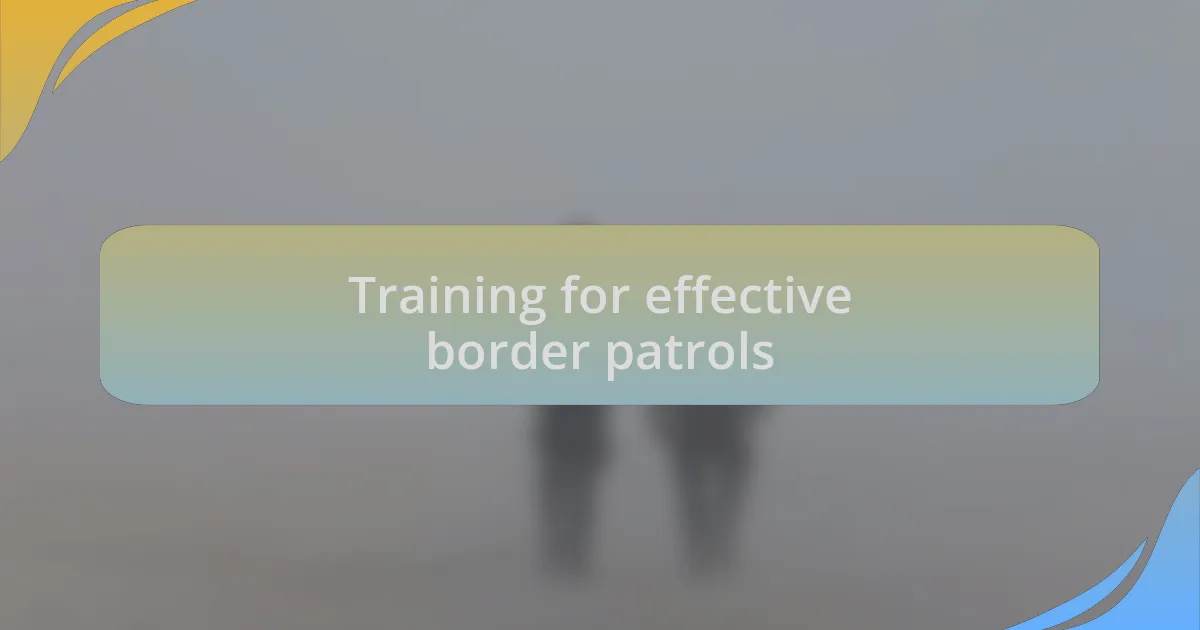
Training for effective border patrols
Training is a crucial aspect of effective border patrols. I remember my initial training days, where every session was filled with practical drills and discussions on real-life scenarios. The emphasis on situational awareness was particularly impactful; I learned how to read the environment and respond quickly, something I still rely on.
Throughout my journey, I discovered that ongoing training is equally important. Regular updates on policies, communication techniques, and crisis management kept me sharp and ready for any situation. It’s fascinating to see how even small adjustments in training can drastically enhance our efficacy as patrols. Have you ever considered how a simple refresher course could change the dynamics of a patrol?
Additionally, networking and collaboration during training foster a sense of camaraderie. I fondly recall the friendships formed during joint exercises, which not only built trust but also created a team of dedicated individuals focused on a common goal. This bonding experience often made our patrols feel less like a duty and more like a shared mission to protect our community. How important is it to you to feel connected with those you work alongside?
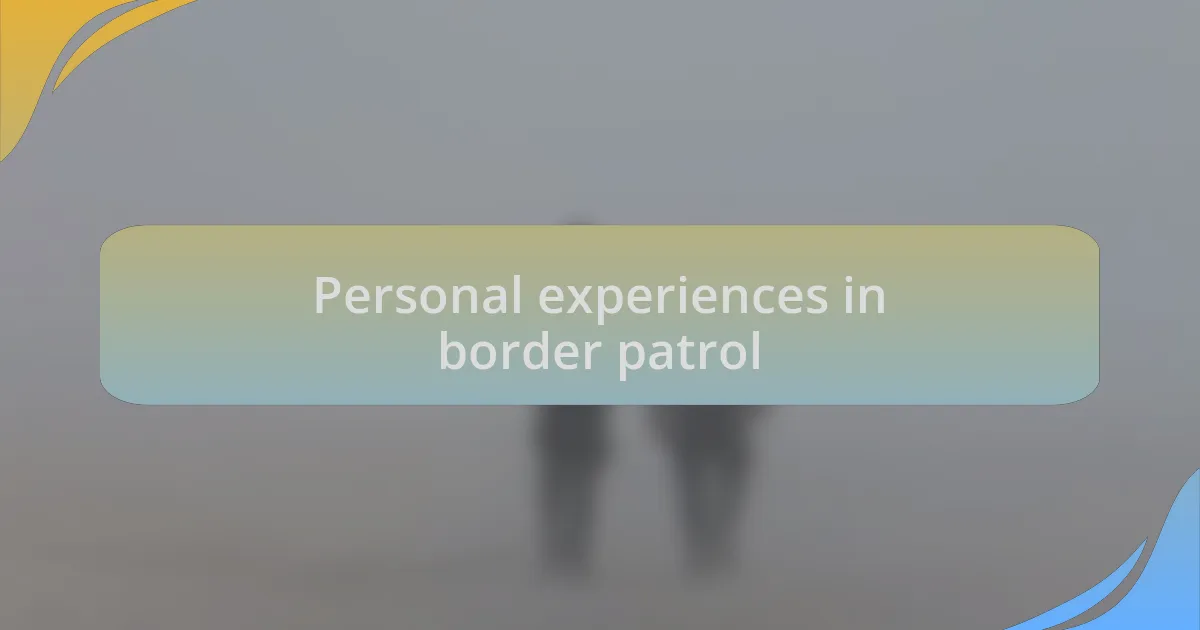
Personal experiences in border patrol
During my time volunteering with border patrol, I was often struck by the unexpected encounters that shaped my experience. One night, while on a routine patrol under a starlit sky, I came across a family seeking asylum. The fear in their eyes was palpable, and in that moment, I had to reconcile my role with my compassion. It was a profound reminder that behind the regulations and policies, there are human stories.
I vividly recall my first apprehension. My heart raced as we approached a group crossing the border, each person a little anxious yet hopeful. It felt surreal to be in that position, serving a role that combined security with empathy. It made me wonder how often we fail to see the individuals behind the statistics. Have you ever considered how the weight of a simple encounter can linger in your heart for years?
As time went on, I learned that beyond the protocols and procedures, trust was the cornerstone of our operations. One evening, in the middle of a tense situation, I saw the importance of building rapport with local communities. When residents approached me with tips or concerns, it felt like a partnership—a shared investment in safety. This experience taught me that effective border patrol isn’t just about enforcement; it’s about connection. How has trust shaped your experiences in community service?
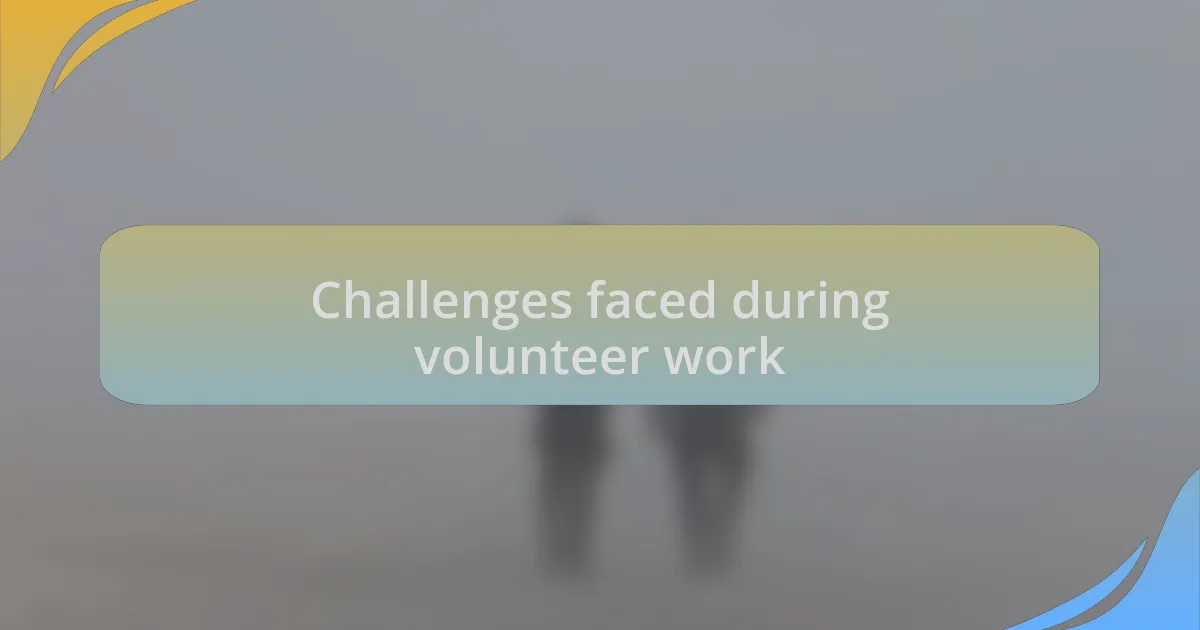
Challenges faced during volunteer work
As I delved deeper into my volunteer work, I faced the challenge of witnessing the dire conditions many individuals endured while crossing the border. One evening, I encountered a group of exhausted migrants who had traveled for days under the scorching sun. It was hard for me to balance the urgency of providing assistance with the fear of overstepping my role. Have you ever felt torn between following rules and doing what seems inherently right?
Another obstacle was managing the emotional toll that these encounters took on me and my fellow volunteers. There were nights when I returned home feeling heavy-hearted, grappling with the stories of desperation and hope that lingered in my mind. How does one reconcile the need for borders with the undeniable humanity of those seeking a better life?
Additionally, I learned that navigating the complexities of law enforcement and community expectations was no easy feat. I recall a particularly intense moment when community members expressed their frustration about security measures while simultaneously voicing their concerns about safety. It struck me how delicate the balance was—building trust and ensuring security without losing the connection to the community. Is it possible to find common ground in such a polarized environment?
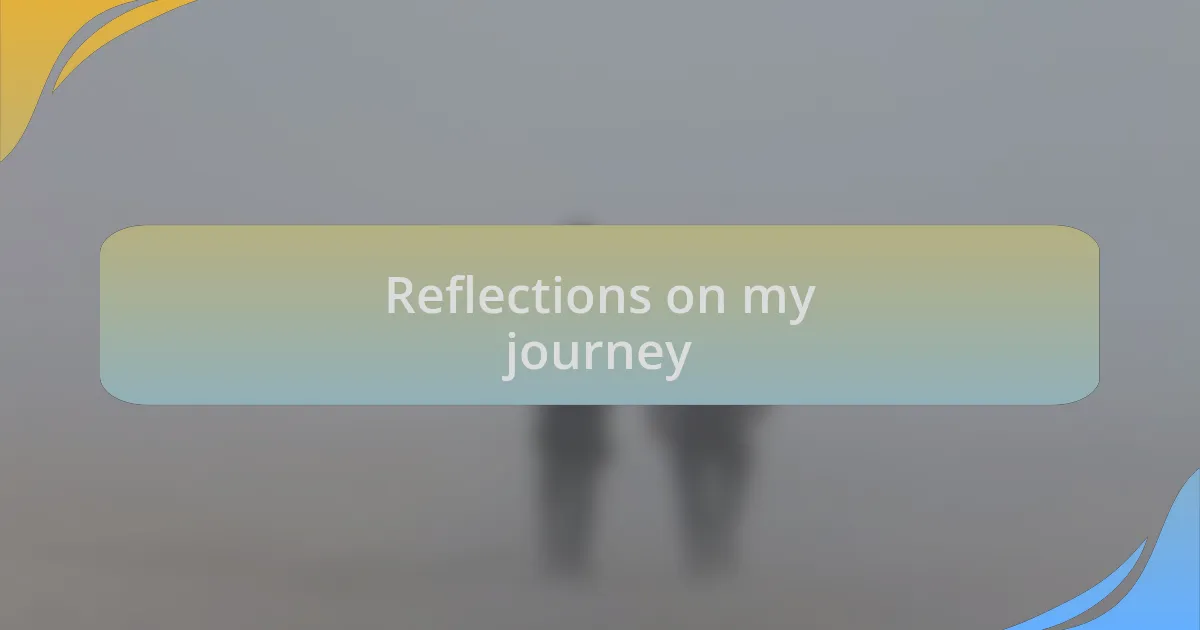
Reflections on my journey
As I reflect on my journey, I often find myself thinking about the profound shifts in my perception of borders and humanity. One night, as I shared a meal with a family whose path had been fraught with danger, I felt an unexpected connection. In that moment, I realized that these encounters were not just statistics or crises; they were personal stories filled with dreams and struggles. How could I ever forget the faces of those who opened their hearts to me, trusting that I would try to understand their plight?
The experience shaped my understanding of resilience. I vividly remember a young woman who had left her home country in search of safety. When she shared her dreams of education and a better future, I felt a surge of hope mixed with profound sadness. It dawned on me just how intricately our lives are woven together despite the barriers that divide us. Could I really reconcile my role in enforcement with the compassion needed to support such aspirations?
Looking back, I see how these challenges not only tested my commitment but also deepened my empathy. There were days when I asked myself if I was making any real difference. Yet, each small act of service, each shared smile or comforting word, reminded me that sometimes, even the smallest gestures can ripple through lives in unexpected ways. Have I changed the world entirely? Perhaps not, but I’ve seen firsthand how a little kindness can spread hope in places where it’s desperately needed.